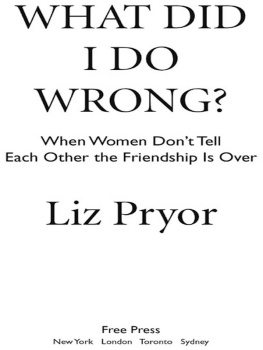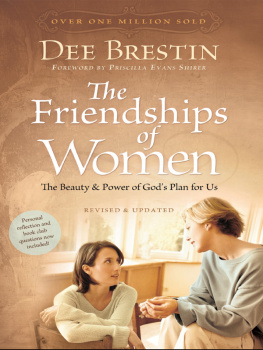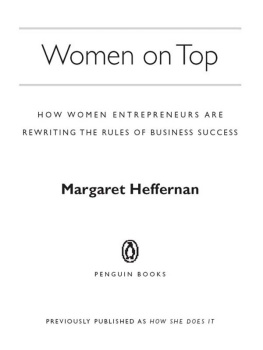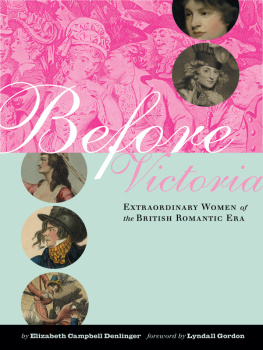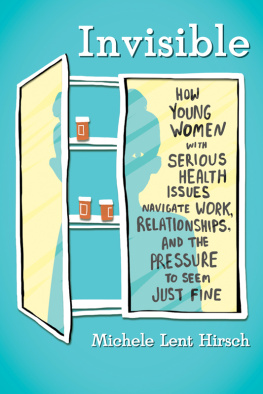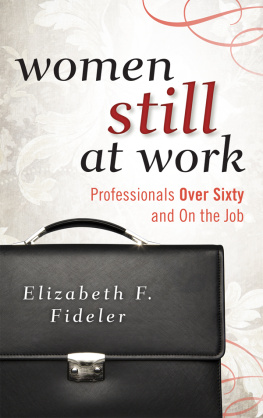Praise for Dumped
This remarkable collection provides an exhilarating range of voices exploring what happens when female friendships falter. Wise, compassionate, and smart, each of these essays is a revelation. Give your best friend a copy along with a warm, thankful hug.
Dinty W. Moore, author, The Mindful Writer
Dumped touches a nerve from page one. It touches on a subject that all women know too well, yet is complicated and painful to articulate: the mourning, and sometimes redemption, that comes from being dumped by a sister-like friend. For every woman who has ever drowned her sorrows in a pint of ice cream over the loss of a close friendor simply needs to know she is not alonethis book is for her.
Elisa Batista, publisher of MotherTalkers.com, a Daily Kos community
This very honest, very human, and often very hilarious book made me laugh, cry, nod, squirm, and think anew about friendships gone by. Big applause to Nina Gaby, and all the contributors, for crystallizing so finely the inescapable life experience that is the end of a friendship.
Suzanne Strempek Shea, author of This Is Paradise: An Irish Mothers Grief, an African Villages Plight, and the Medical Clinic That Brought Fresh Hope to Both
The essays in Dumped are ferocious and loving, devastating and hopeful, insightful and perplexing. A savage, thorny look at friendship and a rare, uncensored, sometimes terrifying glimpse into the female psyche.
Neil White, author of In the Sanctuary of Outcasts and publisher
What goes on between men and women has been examined in literature for many years. This terrific collection of stories, however, probes the largely unexplored, perhaps sacrosanct, territory of what goes on between women. Lively and astute, candid and wrenching, the pieces reveal the clumsy dismantling not just of friendships but also of our own notions of ourselves as friends, meaning our own capacitiessometimes limited, sometimes capaciousfor relationships with other women. An enlightening and long-overdue collection.
Barbara Hurd, author of Walking the Wrack Line
In these essays lie honest portraits of break-ups of the most ancient kind, blood letting stone, an abrupt jolt that equals part orphan, part refugee. We leave our sisters suddenly, without warning or explanation, beside the road of untamed life. Rudderless, without us. Without each other. And therein lies the key, I knew the moment Nina mentioned this collection that she was on to something. A hotspot of not only what ignites us breaks our hearts as well.
River Jordan, author of Praying for Strangers
Dumped is an often revelatory, heart-wrenching compendium, immensely readable, fascinating in its tragic familiarity, and among the best books available on the tenacity of our human desire to connect, and stay connected, even with those with whom the connections were, in the final analysis, ephemeral and fleeting.
Burl Barer, author of Man Overboard and Body Count
dumped

Copyright 2015 by Nina Gaby
All rights reserved. No part of this publication may be reproduced, distributed, or transmitted in any form or by any means, including photocopying, recording, digital scanning, or other electronic or mechanical methods, without the prior written permission of the publisher, except in the case of brief quotations embodied in critical reviews and certain other noncommercial uses permitted by copyright law. For permission requests, please address She Writes Press.
Published 2015
Printed in the United States of America
ISBN: 978-1-63152-954-2
e-ISBN: 978-1-63152-955-9
Library of Congress Control Number: 2014956082
For information, address:
She Writes Press
1563 Solano Ave #546
Berkeley, CA 94707
She Writes Press is a division of Spark Point Studio, LLC.
How I Lost Her, by Ann Hood, was previously published in Jenny Offill and Elissa Schappell, eds., The Friend Who Got Away: Twenty Womens True-Life Tales of Friendships that Blew Up, Burned Out, or Faded Away (New York: Broadway Books, 2005). Reprinted with the authors permission.
A slightly different version of Ten Days, by Suzanne Herman, was previously published in Heather Tosteson and Charles D. Brockett, eds., Connected: What Remains As We All Change (Atlanta: Wising Up Press, 2013). Reprinted with the authors permission.
The contributors have changed some names, places, and recognizable details to protect the privacy of friends and family members mentioned in some of these essays.
Excerpt from Autotomy from POEMS NEW AND COLLECTED 1957-1997 by Wislawa Szymborksa, translated from the Polish by Stanislaw Baranczak and Clare Cavanagh. English translation copyright (c) 1998 by Houghton Mifflin Harcourt Publishing Company. Reprinted by permission of Houghton Mifflin Harcourt Publishing Company. All rights reserved.
To my husband, Craig Smith,
who still hasnt dumped me.
And my mother, Ruth Gaby, who always
thought I should have known better.
In danger, the holothurian cuts itself in two.
It abandons one self to the hungry world
and with the other self it flees.
It violently divides into doom and salvation,
retribution and reward, what has been and what will be.
An abyss appears in the middle of its body
between what instantly becomes two foreign shores.
From Autonomy, Poems New and Collected
Wislawa Szymborska
Bitches be bitches
Ladies room stall, mall, Western New York
Contents
Groups are easily swayed by conflict. For some, the desertion must have felt like a stampede.
Against the impossible. Author as bystander, holding the unfortunate mirror.
Friendship viewed through a murky lens. What did we really want to see?
Striving for balance.
Finding meaning in the negative spaces.
Foreword
Victoria Zackheim
A ristotle defined friendship as a single soul dwelling in two bodies. In Nina Gabys Dumped: Stories of Women Unfriending Women, twenty-five post-Aristotelian writers explore the painful experience of unfriending, a word recently conferred a rather prominent place in our social mediadriven lexicon. To fully comprehend the trauma of a friend severing ties with usor, as Gaby words it, of being unfriended and unceremoniously dumpedwe must first understand the importance of friendship.
The friendship between womenwhether we harken back to the biblical, historical, literary, or junior high school varietyhas ever been an alliance in which we share parts of our selves: secrets, fears, petty gossip. We enter into this relationship with the belief that what we confide will remain private, protected.
We trust friendship, put our faith in it, sometimes forget how precious it is, and occasionally betray it. When it works, when the connection is true and safe and heartfelt, it is magic: a hand that calms, a smile that encourages, a voice that soothes, a text or e-mail that urges us to inhale and then to exhale. In whatever form, friendship is a presence reminding us that we are never alone.
When a friendship that has sustained us suddenly disappears, we are left emotionally and physically raw bereft. All the women in this collection have addressed heart-on the meaning of friendship in its many forms, and the consequences of a friendship gone bad.


